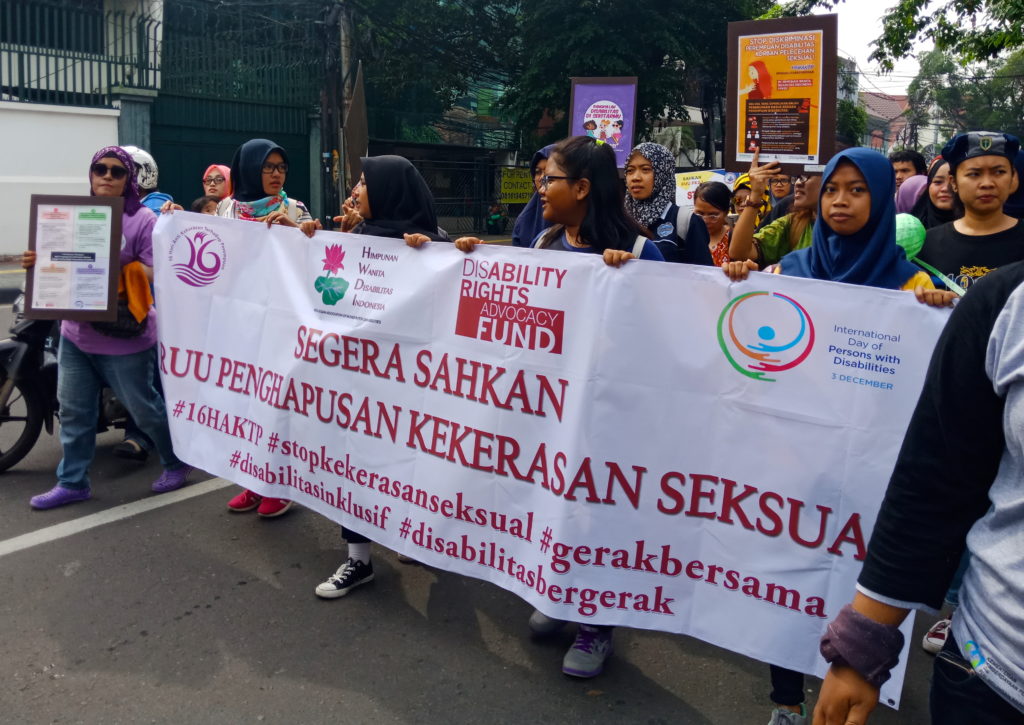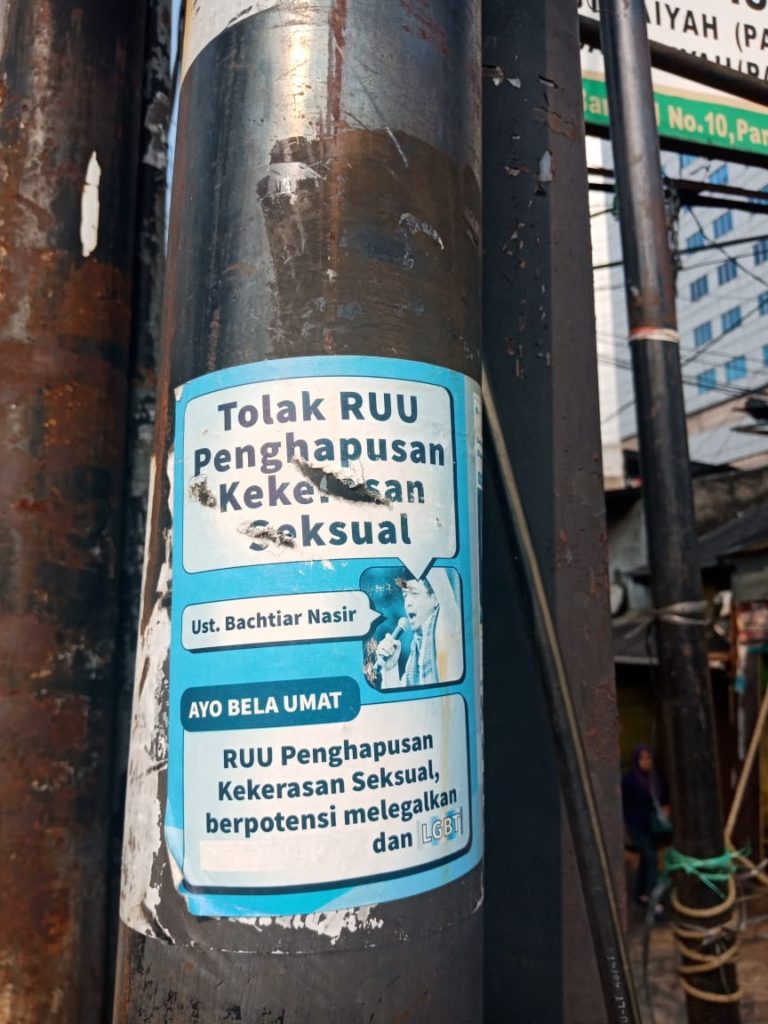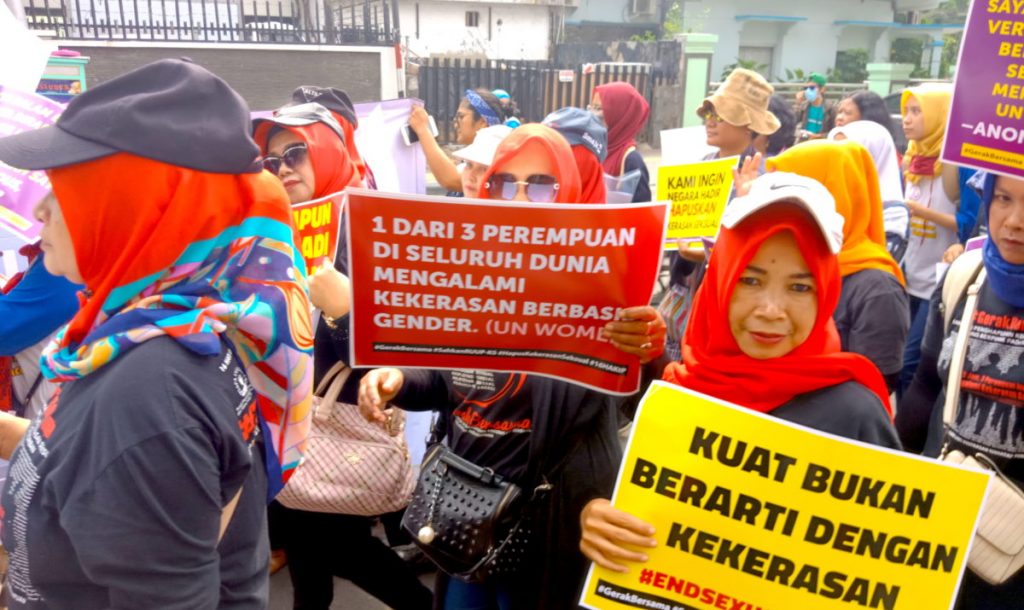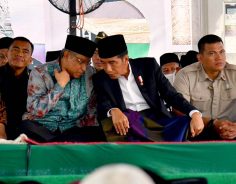When the votes were counted in Indonesia’s 2019 elections, women activists had one thing to welcome: the number of women in national parliament had increased to 20.4%, up from 17.3% in 2014. Many feminists welcomed this progress, hoping that the greater presence of women would contribute to more gender-sensitive policy.
Not all of the recently-elected representatives, however, have a clear gender perspective, and some even declare themselves anti-feminist. The highly patriarchal nature of political parties, and the shift towards a more conservative Indonesian society, also present obstacles that women legislators must face when advocating for progressive gender policies. The number of women who gained parliamentary seats in the 2019 election is therefore a simplistic measure of how women actually performed. The real discussion should focus on what these women legislators could do in the next period to pass better policies for women.
In my previous article, I argued that the rise of religious conservatism has notably affected the dynamics of how women are engaging in politics. The battle between feminists and conservatives over the framing of narratives in Indonesia is not a new phenomenon, but in today’s political climate the conservatives have the advantage. Conservative groups are now consolidating their organisations to take aim at policies that regulate aspects of “morality”, and are also pushing a conservative agenda outside of parliament. Conservative organisations are producing analytical reinterpretations of gender and feminism that undermine the original theories proposed by feminists, and aiming these messages at women and young girls who have limited understanding of these concepts.
We need to look beyond the lawmakers pushing for women’s rights agendas, and focus on how Indonesia’s feminists and women’s rights activists can counter the narrative presented by conservative groups. I met activists from various backgrounds to hear their reflections on the movement to date. These conversations led me to the conclusion that Indonesia’s present-day feminist movement is fragile: while individuals and groups joining the movement are increasing in number, they are fractured and struggle to engage with the grassroots. This presents a challenge to making the movement more sustainable and impactful. Feminists and women’s rights movements need to address these shortcomings to curb the conservative narrative.
A ’new hope’?
We are going to see more diverse faces in legislative bodies in the next governmental period. Some are women with commitments to protecting women and children’s rights. One such legislator is Netty Prasetyani from the Prosperous Justice Party (Partai Keadilan Sejahtera, or PKS). The wife of former West Java governor Ahmad Heryawan (Aher), Netty took a leading role on women’s and children’s issues during Aher’s administration and oversaw the provincial P2TP2A (Pusat Pelayanan Terpadu Pemberdayaan Perempuan dan Anak), an integrated support service for women and children victims of violence.
In my interview with Netty, she showed a commitment to the elimination of underage marriage and support for the proposed Elimination of Sexual Violence Bill, (known in Indonesia as RUU P-KS, not to be confused with PKS the party), as the current criminal code law does not cover the protection and rehabilitation of victims. Netty’s position is peculiar given her membership of PKS, and the party’s official opposition to the bill. Nonetheless, she acknowledges this contrast and encourages dialogue between opponents in her party and supporters of the bill. It might not be easy, but she believes bridging differences will open up conservative perspectives on sexual violence cases.
Furthermore, there are opportunities for women representatives to secure more strategic positions in the next parliamentary period. Puan Maharani is the daughter of former President Megawati Soekarnoputri and the Coordinating Minister for Human Resources and Culture during President Joko Widodo’s first administration, and is said to be a candidate for the next speaker of the national parliament (DPR-RI). If successful, Puan would be the first woman to take on the position. Masruchah, Commissioner of National Commission on Violence against Women (Komnas Perempuan) is optimistic that Puan’s appointment would benefit the cause, stating, “She is a woman; she shares similar experiences [with women]. She has learned about women and children issues during her administration as the Coordinating Minister of Human Resources and Culture. She urged DPR-RI to make progress in discussions of the Elimination of Sexual Violence Bill.”
Meanwhile, an emerging contender, The Indonesia Solidarity Party (Partai Solidaritas Indonesia, or PSI), has been considered the new hope for better policies for women. Having garnered substantial votes in major cities across Indonesia, including Jakarta and Bandung, PSI is now ready to compete in local parliaments. However Dhyta Caturani, a veteran Indonesian feminist and the head of Purple Code, a feminist organisation working on cyber security issues, cautioned against expecting too much:
“PSI needs to be tested. I know people in PSI, and some of them are activists. There are progressive individuals there. But, in politics, you cannot only be kind. The system is so strong, so it’s important that you have the capacity and capability to play the game. Experience is critical.”

INTERNATIONAL WOMEN’S DAY IN JAKARTA, MARCH 2019 (PHOTO: AUTHOR)
• • • • • • • • •
Key policy issues in Jokowi’s second term
The new legislators will have a lot of work to do if they plan on collaborating with feminists and women’s rights activists in the next five years. A number of key policies might well become the battleground between feminists and anti-feminists on moral issues ranging from sexual violence to enforcing dress codes and curfews on women.
The first policy issue concerns the revision of the 1974 Marriage Law to increase the minimum age of brides from 16 to 18. The law also contains problematic clauses that perpetuate the unequal position of men and women within households, and permits polygamy. Women’s activists have two options: to push for the revision of other clauses, or, more critically, assist in the preparation of a government regulation (Peraturan Perundang-undangan, or Perppu) that will regulate the age limitation in lieu of a change in legislation.
The second policy issue is the hotly-debated Elimination of Sexual Violence Bill. While the bill aims to enshrine the prevention and prosecution of sexual violence, and rehabilitation for victims, some religious conservative groups oppose the bill on the grounds that it is Western-influenced and disruptive to family values.
Despite the controversy, there is little parliamentary interest in finalising the bill anytime soon. PKS rejects the bill and argues that Indonesia needs to adopt preventative measures—instead of taking curative action—in cases of sexual violence, and has endorsed the Family Resilience Bill (RUU Ketahanan Keluarga) as the solution. Within Indonesia’s highly patriarchal society, though, the concept of “family resilience” is often misunderstood as placing the onus of moral responsibility on women, and conservatives consider the Family Resilience Bill an acceptable alternative to the Elimination of Sexual Violence Bill. The Regional Representatives Council (Dewan Perwakilan Daerah, or DPD-RI) first proposed a draft of the Family Resilience Bill to the national parliament in 2017, and PKS will likely push the discussion of the law in the next period. When responding to the proposal, feminists need to be critical to avoid misconceptions and possible contradictions with their agenda.
The third policy involves the implementation of discriminatory local bylaws. In 2017 the National Commission on Violence against Women (Komnas Perempuan) noted around 421 discriminatory policies across Indonesia, and the number continues to increase. Politicians are likely to publish populist regulations, and with the rise of conservatism in society, there will be more such discriminatory policies which undermine women’s bodily autonomy: through curfews, or regulations on how women should dress. Recently, in the city of Depok, a proposed law to control how people dressed based on religious norms was shot down by the city council.
Reflecting on those challenges, Indonesian feminists need to solidify their actions and develop concrete steps to create the social conditions that will support progressive legislative change. Feminists therefore need to gear up to challenge the growing conservative influence; but what are the modalities that they have to work with?
Feminism and its discontents
Indonesia’s feminists have historically adopted multiple approaches—liberal, radical, and intersectional—to address struggles that span land rights, voting rights, worker protection, protection from sexual violence, and more. However, the rapid growth of digital feminist activism, influenced by the global feminist movement, has created a perception amongst conservatives of a singular feminist movement in Indonesia. Conservative groups are now making sweeping assumptions that feminism is only advocating for “liberal” values, such as bodily autonomy and LGBT rights, as opposed to a broader and more intersectional approach that includes the interpretation of feminist theory from an Islamic worldview.
The recent growth of Indonesia’s feminist movement is largely due to the success of online activism in mainstreaming gender and feminist narratives, and is a promising sign of progress in achieving gender equality in Indonesia. Many digital feminists are young, well-educated, and connected to the global movement. They are savvy in the use of social media as primarily a tool to educate, engage, and mobilise their followers. The worldwide Women’s March campaign and the #MeToo movement have also spurred young Indonesian feminists to build an alliance and attract more people to join the cause. At least 4,000 people joined this year’s Women’s March in Jakarta, doubling last year’s attendance, and activists used the event to urge DPR RI to pass the Elimination of Sexual Violence Bill. As veteran feminist Dhyta Caturani asserts:
“This is the biggest feminist movement in Indonesia unlike anything I’ve seen in my 25 years of activism. There are many self-proclaimed feminists, individuals, and groups. When I started One Billion Rising [part of a global campaign to combat sexual violence against women and girls] in 2013, many were not even comfortable with the term ‘feminism,’ and now it has changed.”
Online initiatives have emerged in response to growing demand for feminist information in Indonesia. Established in 2013, Magdalene is a feminist online magazine that provides a platform for young Indonesian feminists to share their personal experiences and commentary on how the socio-political environment has impacted their lives. The website publishes short articles and interviews and recently branched out to podcasts, and generates an average 150,000 page views each month. Other smaller-scale, online-based initiatives have emerged to introduce feminist concepts to young Indonesians, such as Jakarta Feminist Discussion Group, Indonesia Feminis, Konde.co, and more.
At the same time, the Muslim feminist movement has continued to evolve, and provides an important space for organizations to expand their grassroots network when striving for gender justice in Islam. In 2017, three Muslim organisations named Alimat, Rahimah, and Fahmina (ARAFAH) initiated the Indonesia’s Women Ulemas Congress (Kongres Ulama Perempuan Indonesia, or KUPI) in Cirebon, West Java, bringing together approximately 2,000 ulamas (Islamic clerics) and academics from across Indonesia. The gathering is vital proof that gender equality has always been part of Islamic teaching, countering the hard-liners’ assumptions about the position of women in the Islamic hierarchy. The congress resulted in the condemnation of three major problems: sexual violence, child marriage, and environmental degradation. The women ulemas continue to spread this message in their study circles and public policy advocacy, including the Elimination of Sexual Violence Bill.
Younger pupils of Islam with an interest in gender justice can turn to individuals who are known for their critical analysis, such as Kalis Mardiasih, a columnist with a pesantren (Islamic intensive schooling) background, and Laily Fitry, a PhD candidate in theology. Furthermore, community-led small initiatives are also growing, such as Forum Islam Progresif, a leftist-based organisation that facilitates discussion on feminism and Islam, and the Halaqah Muslimah Progresif, an online-based discussion about gender and Islam. Both groups target students and young people across Indonesia by using Instagram, the most popular form of social media, as their main platform to spread the message. Naila Fitria, the founder of Halaqah Muslimah Progresif, said:
“We want to counter and balance out the ‘hijrah’ narrative offered by Muslim conservatives. It is sickening. They use religion as their central argument. Therefore, we cannot use secular feminists’ argument to counter their massive campaign. We need to produce pro-women reinterpretations that stem from religious doctrine to curb their narrative.”

AN ANTI-ELIMINATION OF SEXUAL VIOLENCE BILL STICKER ON A LAMP-POST IN JAKARTA (PHOTO: AUTHOR)
• • • • • • • • •
Fractures in the feminist movement
Unlike the conservative movement, which promotes a single religious narrative when campaigning for their ideas, feminists grapple with multiple sites of oppression, and consequently tend to be reactive when responding to specific policies. As Dhyta Caturani says:
“The movement is scattered, and that’s our loss. The [conservatives] are solid; we are not. Our work actually complements each other but is not sewn together well. They have an anchor of the movement, whereas feminism has many issues to fight for: LGBT rights, bodily autonomy, right to work, and so on. We don’t have an overarching solution for these problems.”
NU after the elections: more nationalism, less democracy?
Jokowi owes his victory to NU support, and NU expects both material and ideological dividends.
There are other more fundamental debates about class and religion. Dhyta Caturani says that feminists still think the long-standing struggle of women farmers and workers is not fully situated within the feminist movement, because these women still experience a patriarchal culture at home. Additionally, in March 2018 two students were banned from their campus for wearing a face veil clothing (niqab), provoking debate about whether the niqab can be considered a woman’s choice or a form of oppression. The cracks not only cause public bewilderment about the feminist endeavour, but also create fractures within feminist movement itself.
Different approaches to feminism mean different strategies are needed to include more people in the movement. Muslim feminists, for example, are not comfortable with using the terms “gender equality” and “feminism” in their community. They prefer to say “gender justice”, a value that Islam upholds. As Naila Fitria said:
“Muslim feminists use very subtle words to be accepted by the community. For instance, I use gender justice, not gender equality, because it is safer, especially if the male participants are present [in the study circle, or pengajian] . They will protest because it is scripted in the Quran that men and women are not equal. Thus, I declare myself a Muslim feminist. If I said I am a feminist, they won’t accept me.”
Where one group prefers to be bold in their fight against discriminatory practices, others prefer to use subtler methods. Take the Indonesia Solidarity Party (Partai Solidaritas Indonesia, PSI) and their campaign against polygamy as a form of violence against women. Some women’s rights activists were not comfortable with their strategy and thought it would harm the years of advocacy undertaken by Muslim feminists. Here is Masruchah’s reflection on the PSI anti-polygamy campaign:
“We mostly agree with PSI’s stance, but the anti-polygamy campaign? Don’t use it! We need to look at this as a collective movement, and our approach brings consequences. If you want to turn down polygamy practices, take aim at the Marriage Law. [The forms of] gender-based violence [are] many, but if you go directly to the polygamy issue, it will offend some groups. This is about strategy.”
Where the conservatives use religious argument in disseminating their message, feminists could use a similar strategy by producing a more progressive interpretation that attracts those who are currently undecided. Has it been effective in reaching the wider public?
Is Indonesia’s feminist movement too elitist?
After the translated version of my article on anti-feminist politics appeared in Tirto.id, the Family Love Alliance (AILA) criticised it for being reflective of a feminism which only benefits people from urban, western-educated backgrounds, saying that: ”…This is what I always say, everywhere, that feminism is not about women, let alone fighting for women’s life. It is not a women movement, but an elite women’s movement.”
Some women activists I met with agreed with the critique. Dhyta Caturani says:
“This is my criticism of Indonesia’s feminist movement. Most of the liberal feminists came from an urban and middle-class background. They have the privilege to access so many things, like feminist references in English. What have they done to break it through? Has intersectionality, as our jargon, been applied to our movement? Yes, but only a few of them.”
Naila Fitria agrees that feminists need to work at the grassroots level to counter the conservative movement. She says, “If you circulate your ideas amongst the middle class, we would always be a minority. Intellectuals should be [engaging] at the grassroots. It is indeed tiring, and requires extra work, but that’s exactly what they [the conservatives] are doing today.”
To say that feminist movement is entirely elitist would disregard years of activism by grassroots feminist organisations working to create change from below. Take, for example, the Indonesian Women’s Coalition, which works for women’s leadership education; Migrant Care, which advocates on behalf Indonesian migrant workers; and PEKKA (Pemberdayaan Perempuan Kepala Keluarga, or the Empowerment for Women Head of Households), who extensively engage with women workers; and longstanding religious based-organisations such as Fatayat NU and Aisyiyah Muhammadiyah.
However, feminist movements indeed have elitist tendencies, with heavy use of jargon and privileges. Most Indonesian feminists today come from similar backgrounds: middle-class, tertiary-educated, perhaps at foreign institutions, and maintaining high fluency in English, which enables them to access more feminist literature. Not many of them have extensive experience working at the grassroots level, while the women engaged in the grassroots groups are still prone to conservative campaigns to convert the members of more progressive networks. Feminists need to be more engaged with grassroots movements to prevent the shift within established networks.
The recent successes in women’s representation inside parliament have been influenced by women’s movements working behind the scenes, and the progress seen in women’s representation in politics in the 2019 elections should be acknowledged. During Jokowi’s second term, however, feminists and women’s activists will need to organise themselves better to face the challenges that lie ahead. Feminists must be stronger and more unified than ever, build bridges with “opponents”, and build coalitions with other movements that are crucial to preventing the backslide of feminist progress in Indonesia.
 Facebook
Facebook  Twitter
Twitter  Soundcloud
Soundcloud  Youtube
Youtube  Rss
Rss 



